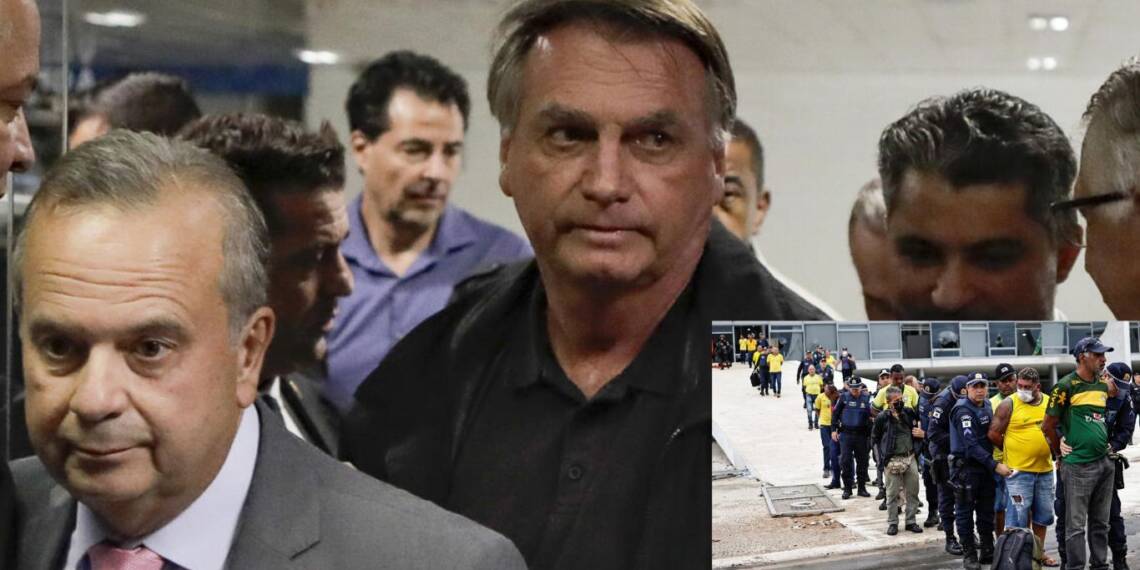Former Brazilian President Jair Bolsonaro finds himself at the centre of an unprecedented legal storm as he faces several charges, including an alleged coup attempt following his 2022 election loss. The indictment, which accuses him of leading a criminal organization to undermine democracy, has sparked deep political divisions, with Bolsonaro and his supporters denouncing the move as a politically motivated attack aimed at destroying his influence in Brazilian politics.
The charges stem from a federal investigation that links Bolsonaro to a conspiracy to prevent his successor, President Luiz Inácio Lula da Silva, from taking office. Prosecutor-General Paulo Gonet alleges that Bolsonaro and 33 others orchestrated a plot to subvert the electoral process, incite riots, and even poison Lula and assassinate Supreme Court Justice Alexandre de Moraes. These allegations, if proven, could carry serious legal consequences, including a potential prison sentence of up to 20 years. Bolsonaro, however, denies all wrongdoing, calling the charges baseless and a blatant example of political persecution.
The Background
To understand the gravity of the situation, one must acknowledge the deeply polarized nature of Brazilian politics. Bolsonaro, a right-wing firebrand and former army captain, rose to power in 2018 by positioning himself as an anti-establishment leader fighting against corruption and left-wing policies. His tenure was marked by strong conservative rhetoric, economic liberalization efforts, and frequent clashes with the judiciary and media. Lula, on the other hand, represents Brazil’s traditional left, having served two prior terms as president and making a remarkable political comeback despite corruption allegations in the past.
The 2022 presidential election was one of the most hotly contested in Brazil’s history, with Lula narrowly defeating Bolsonaro. Bolsonaro never publicly conceded defeat, citing alleged irregularities in the electronic voting system, though no credible evidence of fraud was ever presented. His refusal to acknowledge Lula’s victory fueled tensions, culminating in the January 8, 2023, riots where thousands of Bolsonaro supporters stormed government buildings in Brasília in a scene eerily reminiscent of the January 6, 2021, U.S. Capitol riots.
Following the unrest, Brazilian authorities launched multiple investigations into Bolsonaro’s conduct, with this latest indictment being the most serious legal challenge he has faced. His critics argue that the charges are a necessary step to hold him accountable for attacking democratic institutions. However, his supporters see the case as a politically motivated attempt to neutralize Bolsonaro as a political force ahead of the 2026 elections, where polls suggest he would remain a formidable opponent to Lula’s Workers’ Party.
Bolsonaro’s defence team has reacted with indignation, dismissing the charges as “empty” and lacking substantial evidence. One of the key allegations against him is the supposed plan, dubbed “Green and Yellow Dagger,” to poison Lula and assassinate Justice de Moraes. While the prosecution claims to have digital files, spreadsheets, and message exchanges to back these claims, Bolsonaro’s defence argues that no direct link between him and such extreme measures has been established.
Bolsonaro himself has mocked the accusations, stating, “Have you seen the coup decree? Neither have I.” His legal team argues that while Bolsonaro publicly questioned the electoral system, there is no evidence he actively participated in drafting a coup plan. Even the January 8 riots, though undeniably carried out by his supporters, do not have a clear, proven connection to direct orders from Bolsonaro. His defence contends that accusing him of orchestrating a coup is an overreach designed to ensure his permanent removal from political life.
Another charge is Bolsonaro’s alleged attempt to pressure military officials into backing his claims of electoral fraud. Reports indicate that there were discussions within military circles regarding the possibility of intervening in the election results, but whether Bolsonaro actively coordinated such efforts remains disputed. His backers argue that such discussions were hypothetical and not a concrete plan for a coup, making the charge legally flimsy.
Implications
The indictment now moves to the Supreme Court, which will decide whether to formally proceed with a trial. This raises another contentious issue—whether the Supreme Court itself is acting as a neutral judicial body or as a political player aligned with Lula’s government. Justice Alexandre de Moraes, a key figure in the case, has been a long-time opponent of Bolsonaro and has spearheaded several investigations into him. Bolsonaro’s camp argues that the Supreme Court’s involvement makes a fair trial impossible, given that one of the alleged targets of the supposed plot is directly overseeing the proceedings.
Critics also point out that Bolsonaro has already been politically sidelined through his eight-year ban from running for office, imposed after he was found guilty of spreading misinformation about Brazil’s electronic voting system. This ban alone was seen as a big blow to his political career, making some question why further legal action is necessary unless the goal is complete political annihilation.
If the Supreme Court accepts the charges, Bolsonaro will face a trial that could dominate Brazilian politics for the next year. A conviction would effectively end any hope of a political comeback, as Brazilian law prohibits convicted individuals from running for office. However, even without a conviction, Bolsonaro could still use the trial to rally his base, portraying himself as a victim of judicial overreach and a corrupt establishment trying to silence conservative voices.
Bolsonaro’s indictment is a historic moment in Brazilian politics, with implications that go beyond his personal fate.
As the legal battle unfolds, the case will serve as a litmus test for Brazil’s institutions. Will it be a legitimate effort to uphold democracy, or will it be remembered as an example of judicial overreach against a political adversary? Regardless of the outcome, Bolsonaro remains a formidable figure in Brazilian politics, and his trial will shape the country’s political landscape for years to come.








